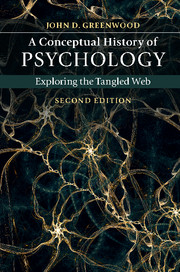Book contents
- Frontmatter
- Contents
- Preface
- 1 History, science, and psychology
- 2 Ancient Greek science and psychology
- 3 Rome and the medieval period
- 4 The scientific revolution
- 5 The Newtonian psychologists
- 6 Physiology and psychology
- 7 Theories of evolution
- 8 Psychology in Germany
- 9 Psychology in America: the early years
- 10 Functionalism, behaviorism, and mental testing
- 11 Neobehaviorism, radical behaviorism, and problems of behaviorism
- 12 The cognitive revolution
- 13 Abnormal and clinical psychology
- Epilogue: the past and future of scientific psychology
- Index
- References
Epilogue: the past and future of scientific psychology
Published online by Cambridge University Press: 05 September 2015
- Frontmatter
- Contents
- Preface
- 1 History, science, and psychology
- 2 Ancient Greek science and psychology
- 3 Rome and the medieval period
- 4 The scientific revolution
- 5 The Newtonian psychologists
- 6 Physiology and psychology
- 7 Theories of evolution
- 8 Psychology in Germany
- 9 Psychology in America: the early years
- 10 Functionalism, behaviorism, and mental testing
- 11 Neobehaviorism, radical behaviorism, and problems of behaviorism
- 12 The cognitive revolution
- 13 Abnormal and clinical psychology
- Epilogue: the past and future of scientific psychology
- Index
- References
Summary
The last chapter demonstrates an important feature of the historical development of clinical psychology and other subdisciplines such as social and developmental psychology in relation to the general development of psychology in America in the twentieth century. The development of many of these subdisciplines did not simply parallel the general development of psychology in terms of the historical progression from structural to functional psychology, and from behaviorism to cognitive psychology. While theories and therapies based upon behaviorist learning theory and cognitive processing were developed in clinical psychology, they were developed together in the postwar period, which marked the end of the behaviorist hegemony in general psychology. While some early social psychologists called themselves behaviorists, they remained committed to the study of social attitudes and public opinion from the beginning to the end of the twentieth century. Moreover, developmental psychologists never embraced the general commitment by psychologists (including social psychologists) to experimentation as the essence of scientific psychology.
This illustrates the contingency of the development of American psychology. Although one may trace the conceptual continuities and discontinuities between the development of structural and functional psychology, and behaviorism and cognitive psychology, it is well to remember that the development of American psychology depended upon the particularities and peculiarities of the social, cultural, political, and institutional context in which it developed, and the vagaries of the careers of individual psychologists.
This contingency becomes especially apparent when one compares the twentieth-century development of American psychology with the development of psychology in other countries (Baker, 2012; Sexton and Hogan, 1992; Sexton and Misiak, 1976). To take a few illustrative examples, Italian psychology embraced cognitive psychology in the early 1920s and never looked back (Mecacci, 1992). When George Miller critiqued the behaviorist position at a talk he gave in London in the 5411960s, his host pointed out that there were only two behaviorists in Britain, and apologized for the fact that neither was in attendance (Miller, 1989). Henri Pieron (1881–1964) articulated the behaviorist position in France in 1908 (Pieron, 1908), but considered cognitive psychology to be an essential component of experimental psychology (Pieron, 1929).
- Type
- Chapter
- Information
- A Conceptual History of PsychologyExploring the Tangled Web, pp. 540 - 544Publisher: Cambridge University PressPrint publication year: 2015



